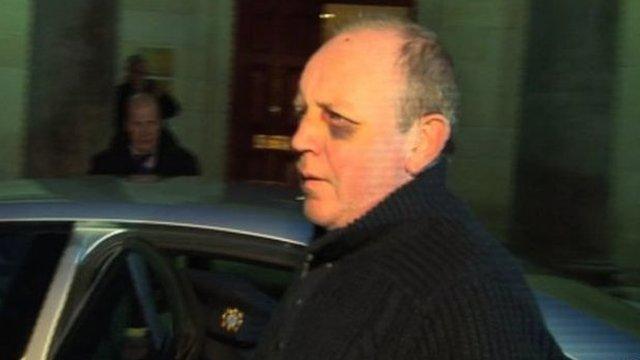Pearse McAuley: Jail term increased for knife attack
- Published

Pearse McAuley was photographed with a black eye after his arrest for the 2014 offences
A republican who attacked his estranged wife with a knife over a four-hour period in front of their children has had his jail term increased.
Pearse McAuley, originally from Strabane in County Tyrone, inflicted serious injuries on Pauline Tully in County Cavan on Christmas Eve 2014.
Dublin's Court of Appeal ruled that the eight-year jail term he was originally given last year was "unduly lenient".
It resentenced him to 12 years in prison, with the final two suspended.
The president of the Court of Appeal described the circumstances of the case as "horrifying".
He added that the fact the attack had happened in the presence of their children, aged seven and four, added an "extra dimension of brutality".
He outlined to the court how McAuley had arrived at his estranged wife's home in Kilnaleck, County Cavan "armed with a knife" at about 11:00 on Christmas Eve morning.
The judge said he punched Ms Tully immediately after she opened the door of the house they once shared.
McAuley then beat the mother of his children, and used a steak knife to inflict multiple wounds, leaving her scarred and covered in blood.
Ms Tully managed to escape four hours later and hid in a car outside the house, but McAuley followed her out and was trying to break into the car when help arrived.
The director of public prosecutions (DPP) asked the Court of Appeal to re-examine the original sentence imposed by Cavan Circuit Criminal Court in December 2015.
The Cavan judge sentenced him to 12 years, but suspended the final four, meaning McAuley would spend eight years in jail.
The DPP questioned whether the allowance of four years for mitigating factors was too lenient.
The Court of Appeal president agreed, saying McAuley could be said to have been "caught red handed" and therefore his guilty plea was of limited value.
He ruled that court would suspend the final two years instead of four.